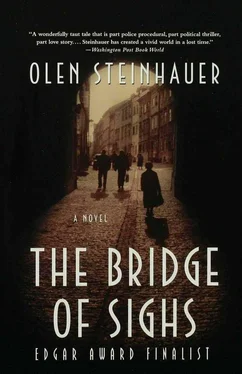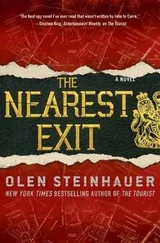Olen Steinhauer - The Bridge of Sights
Здесь есть возможность читать онлайн «Olen Steinhauer - The Bridge of Sights» весь текст электронной книги совершенно бесплатно (целиком полную версию без сокращений). В некоторых случаях можно слушать аудио, скачать через торрент в формате fb2 и присутствует краткое содержание. Жанр: Политический детектив, на английском языке. Описание произведения, (предисловие) а так же отзывы посетителей доступны на портале библиотеки ЛибКат.
- Название:The Bridge of Sights
- Автор:
- Жанр:
- Год:неизвестен
- ISBN:нет данных
- Рейтинг книги:3 / 5. Голосов: 1
-
Избранное:Добавить в избранное
- Отзывы:
-
Ваша оценка:
- 60
- 1
- 2
- 3
- 4
- 5
The Bridge of Sights: краткое содержание, описание и аннотация
Предлагаем к чтению аннотацию, описание, краткое содержание или предисловие (зависит от того, что написал сам автор книги «The Bridge of Sights»). Если вы не нашли необходимую информацию о книге — напишите в комментариях, мы постараемся отыскать её.
The Bridge of Sights — читать онлайн бесплатно полную книгу (весь текст) целиком
Ниже представлен текст книги, разбитый по страницам. Система сохранения места последней прочитанной страницы, позволяет с удобством читать онлайн бесплатно книгу «The Bridge of Sights», без необходимости каждый раз заново искать на чём Вы остановились. Поставьте закладку, и сможете в любой момент перейти на страницу, на которой закончили чтение.
Интервал:
Закладка:
On one of those trams he met Filia, a pale girl married to a soldier not yet back from the war. She was reading a magazine with Soviet dancers kicking legs high on the cover, and when he looked over her shoulder she asked him if he was always so rude. Thin, bitter lips and straw hair. At a cafe he explained that his family had recently returned from the southern provinces, he from abroad; her family, she told him, was dead. Her husband, who had marched off to war years before, was a question mark. Emil never saw her apartment, but she moved her clothes into his, and after they made love she told him stories about her childhood in the mountainous northern provinces. She spoke as though it were a paradise of honesty and brotherhood.
Why don t you go hack? he had asked her, and she only stared at him, as if he were mad.
She had sudden, unexpected moods, when her eyes became cold, dull stones that looked right through him. The squirming fear this provoked in him was always matched by desire.
They ate their meals on the living room floor-whatever was available at the market-and listened to the radio trials of Nazis and their sympathizers, and the reports of the coordinated rebuilding efforts. Russians and British and Americans, briefly, unified. They were rebuilding the Capital too. Russian engineers filled the city with their measuring equipment and cyrillics, and the Soviet soldiers who had arrived a year earlier did not leave.
Once, when she was in a mood, Filia said she only stayed with him because she was afraid of being raped by the Reds. You’re my protection against the Bolshevik drip. He looked at her stone eyes, hurt. Her smile came back and she asked why he had come back to the east, when he could have stayed in Helsinki, or gone on to London. Even America. She said America like an incantation.
Instead of answering, he told her his father had led a campaign through Warsaw that ended in a hero’s death. She didn’t believe him.
You’re telling the story with pauses and bursts; youre a bad liar. Her own husband was at the Front; she could see right through Emil. So he admitted he didn’t know anything about how Lieutenant Valentin Brod had died, nothing except Warsaw and a bullet, this knowledge culled from a sparely worded telegram addressed to his mother, who was by then dead as well. Was she satisfied? Hardly, Filia said, then asked again why he had come back from the west. He said because he needed to meet her. She laughed and said, Seriously.
He told her how his mother had died. Starvation. On the Front.
War and war. She had heard plenty of it, she said. But he told her anyway.
Maria Brod had been one of those nurses who followed their husbands all the way to the battle lines, then died. Stray bullets or disease or, if, like Maria Brod, they were unfortunate enough to become separated from their staff on those vast mountain ranges, they died of starvation and exposure. The Red Army soldiers who came across her body on a ridge of the Tatras mailed her papers back to the Capital, where a friend at their old address forwarded them on to Ruscova. But there was no word on what they had done to the corpse, and Emil imagined her still lying among the snow-stripped trees in the mountains, missing only her identification papers.
Filia didn’t ask anything more-this story, at least, was true. The following Monday morning she left for the factory, and did not return. By then the last of the troops were stumbling back into town, and her husband was no doubt among them. He was alone now, almost out of money, and his grandfather had moved from Ruscova to the Fifth District with a red card and a modicum of prestige.
“Today?” Grandfather asked when the silence of the table had stretched too long. “How was it?”
They were unbearable tonight. Both of them. It was no one thing they said; it was every word, every syllable. He plotted his escape. He would relocate near the water, maybe even the cleaner edges of the Canal District. Over boiled cabbage he did the math, knowing from the start the numbers were doomed, but following them hopefully to their predictable, lacking end. The pittance from the People s Militia would not earn his freedom; bribes, the government assumed, would make up the difference.
He’d had money once, but that had all been frittered away. On that girl.
“A day. Just a day.”
Grandmother frowned at Emil’s wrinkled, soiled suit. “You really must learn to take care of yourself. What’s that on your face?” She wiped the sore on his chin with a spit-damp finger.
He dreamed of seal boats cutting through the ice sheets of the north. A ship of nomads who thought nothing of risking their lives in the miserable cold. They had nothing to lose. They drank heavily and fought on the icy deck; by the time they reached the hunting grounds, the Croat was already dead, having plummeted, drunk, into the black waters. In his dream, when the dissatisfied Bulgarian pulled a knife on him over a card game, his stomach did not sink as it had in reality; it levitated. Then he floated up through the cabin ceiling. He dreamed of little fat bodies, gray and silver bundles sliding down ice slopes into the water, eyes like black coins with a woman’s long lashes. Their insides steamed when he cleaned them out; their red organs misted in the white snow. He dreamed of the Bulgarian who was found among the seal guts, facedown in the gore. Gored himself. Gutted and discarded on the ice.
When he woke his conviction of failure was somehow less inevitable. The night’s sleep, or the passage of time, had rejuvenated him, and he rushed through the alphabetizing of the chief’s files. He ignored its insignificance-the task was something he had to do as quickly and mindlessly as possible. Like the seal carcasses.
A few files fell open, and he scanned their contents. Criminals now locked away in prisons in the provinces, some working in the western swamps, raising land from mud, harvesting reeds. The records went back decades, and the prewar files had stamps with the icon of a crown. All that was over now. Some new files had symbols borrowed from the Soviets, while others-the hawk, primarily-were local. Wings pressed to its sides, its beak in
profile, talons extended. Hammers and sickles and stalks of wheat bent like parentheses. Above a star: 1917.
“Enter.”
He pushed the door open with the S-through-Z box and set it in the far corner. The chief watched as he brought in the other two, stacking them on the first. Then Emil stood before his desk. “Now,” he said breathily. “You have a case? For me.”
The boredom in Chief Moska’s eyes was overwhelming. “Those are in order?”
“Absolutely.”
“Maybe you should give them another look-over. To be sure.”
Emil’s face warmed. He closed the door and, after it latched, stood again in front of the chief’s desk. He spoke clearly and calmly, his jaw muscles tensed: “I don’t know what’s been going on here, why you and your men are acting like this. But I came here as a homicide inspector for the People’s Militia, and if you refuse to give me a legitimate case, I can’t be responsible for what follows.”
The chief leaned back and balanced a stubby pencil between his fingers.
Emil hoped his red face and boldness would give the impression of someone who might do anything if provoked, however reckless. It was the look a young man had to cultivate in the Arctic waters.
The chief brought the pencil to his mouth, his lips closing on it, and when he brought it away there was black residue. He spoke slowly, lazily. “Yesterday. Something came through and, well, I don’t want to waste my men’s time with it.” He was talking to the papers on his desk. His hands had given up on the pencil and were flicking through smeared, typewritten sheets. “Fourth District, a singer. No. Songwriter.” He licked his fingers with a fat, lead-blackened tongue as he searched through the pages. Emil made sure he missed nothing.
Читать дальшеИнтервал:
Закладка:
Похожие книги на «The Bridge of Sights»
Представляем Вашему вниманию похожие книги на «The Bridge of Sights» списком для выбора. Мы отобрали схожую по названию и смыслу литературу в надежде предоставить читателям больше вариантов отыскать новые, интересные, ещё непрочитанные произведения.
Обсуждение, отзывы о книге «The Bridge of Sights» и просто собственные мнения читателей. Оставьте ваши комментарии, напишите, что Вы думаете о произведении, его смысле или главных героях. Укажите что конкретно понравилось, а что нет, и почему Вы так считаете.












